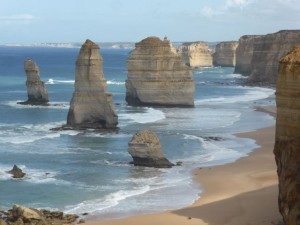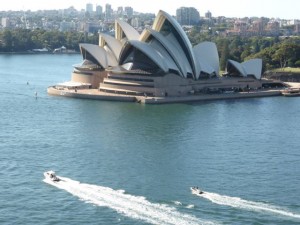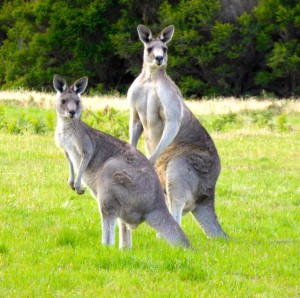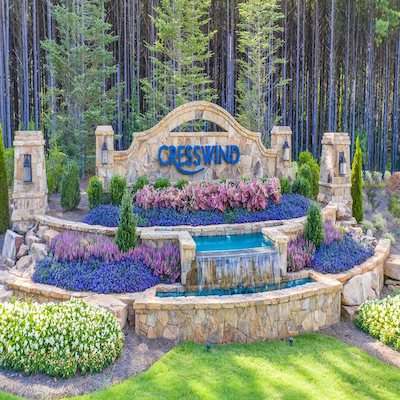Australia and New Zealand on Your Bucket List?
Category: Bucket Lists
February 9, 2015 –Like many retirees you have probably been thinking about bucket list trips as the icing on a hard fought working career. If so the idea of visiting Australia and New Zealand might be near the top. The advantages of such a trip are many. Here we will review some of the reasons for adding this to your list, along with many tips if you do go. This article is mostly about Australia, since that is where your editor recently passed 3 agreeable weeks.
Advantages
Speaking the same language. To make a parallel to what George Bernard Shaw said about Britain and the U.S., we are 2 countries separated by a common language. Travel is definitely easier when you can ask almost anyone for directions.
Rate of exchange. At one point in last few years it took over 1.10 U.S. dollar to purchase 1 Australian dollar. However in early 2015 the latter can be purchased for less than .80 U.S.
Familiar. Americans and Australians are very friendly towards one another. As former British colonies that were later populated with people from around the world, we are both diverse countries that aspire to fun, adventure, and new life. Both countries made enormous sacrifices for the same far off wars in Europe and Asia, up to and including Vietnam and Afghanistan. As one friend of ours commented, if you are heard in an Australian bar with an American accent, you probably won’t have to buy another drink that night.

Great food and wine. The country produces an amazing amount of the world’s finest wines in various regions like the Barossa Valley near Adelaide. In some areas the vineyards stretch on for miles. Just about every restaurant and bar will have some great wines and beers for you to taste. To find out more about that and see some mouth watering photos of Australian food like fresh donuts with salted caramel sauce, check out Lucy Burdette’s Blog post – “Eight Rules for Finding Decent Food – Almost Anywhere“.
Friendly people. Australians are mostly a cheerful and helpful bunch – they will take the time to help you and answer your questions.
Spectacular sites. Alice Springs, Uluru, Great Barrier Reef, are just a few of them, plus the cities.
Disadvantages
It is far way. A flight from Los Angeles is probably a 13-14 hour flight, non-stop. That is a long time in the air. If you can possibly swing Business Class with your frequent flyer miles, or even buy a seat with a little extra room, it will be worth it.
Critters. If you have read Bill Bryson’s most excellent “A Sunburned Country” you will doubtless be aware of the many living hazards in Australia. Poisonous snakes and spiders abound. And Crocodile Dundee could explain to you the dangers of tangling with man-eating crocs.
The wrong side of the road. You drive on the left down under. That is not recommended if you are nervous, tired, at night (lots of animals to hit), or been drinking (and the laws against that are very strict). An automatic will feel more comfortable than trying to shift with your left hand as you enter a roundabout (rotary) from the left!
Tips for traveling
No tipping policy. Unlike the U.S, workers don’t expect a tip. You can leave 5 – 10% if you are pleased, but under no obligation to leave anything
Senior discounts. If a museum or transit clerk asks you if you have “any concessions”, you say yes, you are a senior (60+). That will get you into many museums at no or very small charge, or get a very big discount on public transport.
Public transit. The bus and ferry system is easy to figure out.
Eating and drinking. Aussies love to eat and drink, and the quality of both is very high. Trust your gut – if a restaurant is crowded or the menu looks appealing – there is probably a good reason. Alcohol must be taxed heavily – sometimes the drinks portion of your tab might be about the same as the food part.
Travel guides. The Lonely Planet (located in Melbourne) has a big and excellent guide to the whole country. It and other guides will tell you what to see on either a short or long trip, and where to stay and eat. Trip Advisor and Yelp will give you good suggestions, but you do have to have some skepticism.

If you go – Where to visit
One of the classic discussions is whether to visit New Zealand and Australia on the same trip. There are pros and cons to both. But remember that both countries are huge, so a lot depends on how much time you have to spend. If you have lots and lots of time, do both. Otherwise pick one and come back for the other. Both countries can be visited on a cruise, although New Zealand might be a little better suited. If you go to both Australia and New Zealand in the same trip you should tack on at least another week, and plan on sticking to “the best of”.

Most of populated Australia is located in the southeast coastal portion. That is where Sydney and Melbourne, the 2 largest cities, are found. These are exciting and beautiful cities and shouldn’t be missed. Downtown Sydney is on an exceptionally beautiful harbor book-ended by the iconic Sydney Opera House and the Bridge. You should arrange to go to an opera or musical performance there to get the true sense of the building, or have lunch under its eaves and look out at the water. You can pay to climb the bridge for an incredible view, or you can walk across the pedestrian walkway for free and get almost as good look at the city. Melbourne has food, wine, art, great museums and a very walkable downtown. Go in January and catch the matches at the Australian (Tennis) Open. To get from city to city you will need to fly, or spend days driving or riding on a train across the desert. Perth and Darwin in the west are really far away – almost like driving to California from NY. But they are interesting cities.
The Great Ocean Road and the 12 Apostles (more like 7 or 8) make for one of the world’s great drives. The Great Barrier Reef. Uluru, formerly Ayers Rock, is an unbelievable site with its red rocks and aborigine history, but very hard to get to. Tasmania, located just across a strait from Melbourne is a very interesting land with exotic animals and mountains, and not many people.
Besides eating, drinking, and visiting the museums and other tourist attractions there are whole other worlds to experience. Australia is an outdoors kind of place, with fabulous beaches, mountains, and deserts to enjoy and explore. Hiking and biking opportunities are just about everywhere. Scuba diving and snorkeling are excellent. The unique animals of Australia are a huge draw. Kangaroos can be seen in most of the country. And wherever the right kind of eucalyptus trees grow (preferably manna gums) you can find koalas snoozing or munching their way through the canopies. There are all kinds of exotic birds to add to your life list. Note: Australia has more poisonous snakes and spiders than you want to know about, so caution is the watchword in the outdoors. 
When should you go?
Being in the southern hemisphere, the seasons are reversed. If you go in July you are in their (mild) winter – so crowds will be fewer and rates lower. The Great Barrier Reef tends to get painful and even deadly forms of jellyfish in summer, which could cramp your style.
Expenses, money, and how to save
It is expensive to get halfway across the world – so far away that the time difference between Sydney and New York is 16 hours. You can look around on the Internet for deals to try to get the best air fare. Once there you can use the various guide books to get a bead on less expensive hotels. AirBnb.com is a new idea that will probably give you the best lodging bargains – maybe in someone’s house or apartment. Many B & Bs provide a big breakfast, you can snack for lunch, and try to eat modestly for dinner. As a person over 60 you can usually get a “Concession” that gets you into museums for free or a small charge, plus greatly reduced mass transit fares. Always ask for it.
Credit cards. They are widely accepted, but you will have much better luck if you have one with a chip in it. At some hotels you will pay a % or 2 to pay by cc, Amex will be more. Your credit card company will also charge you a foreign currency transaction fee on your statement. To get Australian $s your best bet is to have a bank debit card – American cards seem to be accepted at all bank ATMs (but we had trouble with the non-bank ATMs).
Travel tips
By air. Carry on restrictions are more onerous in Australia. On some budget airlines you are restricted to one item, and not only will they weigh you your carry on, but you will pay a penalty if it is over 7 kilos (about 15.5 lbs.). If you check luggage after you buy your ticket you will probably pay a hefty premium – and it shouldn’t weight more than 23 kg. Security isn’t quite as tight as it is in the U.S.; you can leave your shoes on and don’t have to keep liquids out and in in a plastic bag.
Buses and trains. You generally need to buy your ticket in advance. For ferries and railroads you can usually get it via a machine or manned ticket booth. Buses are trickier, you need to know the bus number and destination and then buy the ticket at most convenience stores (or better yet, get a multi-day pass). Go online to find schedules and how to buy tickets – or ask your hotel or just about anyone, people in Australia tend to be very helpful.
Taxis. They are safe, reliable, and honest in our experience. We also used Uber; it was a lot easier to get a cab using that app than to hail one on the street. The ride is billed to your credit card. When going to and from the airport you can take the train in most cities, or you can go online and book a van to share with others.
Driving (see disadvantages above). Add to those that the law is very strict. On some roads cameras will time you between 2 points. If your average speed through them was above the posted limit, not only will you get a whopping fine added to your car rental, but the rental firm will add a hefty penalty for their trouble. The same goes for going through a toll road without a tag or pass. Fortunately there aren’t many toll roads outside of Sydney or Melbourne, and you can buy a 1 day pass at many petrol stations, or online. For a fun look at Australian road signs check out this Blog.
Can you retire in Australia?
The short answer is probably not, unless you already live there or are married to a resident. There is an exemption for wealthy investors with $750,000 in assets, another $750,000 to invest here, plus a good income and health insurance. For more details see our Guide to Retiring in Australia.
Bottom line
If you decide to go, enjoy your trip. You will have a great time.
Comments? Have you been to Australia or New Zealand – or thinking about it? Please share your travel tips and/or concerns/experiences in the Comments section below.
For further Reading
Cars of the 50s Ignite Baby Boomer Nostalgia in Cuba
Antarctic Adventure
Bagging the National Parks
Wow, Your Bucket Lists Are Amazing







Comments on "Australia and New Zealand on Your Bucket List?"
Dave Hughes says:
This is a fantastic article, but it's all about Australia. No question - Australia is great. I've been to Sydney and Melbourne, and I can't wait to go back to visit those cities again and discover more of the continent.
Both countries are very expensive compared to most U.S. cities. Generally, expect to pay about twice as much for most things as you would in the U.S. Public transportation is reasonable, though. Don't let that dissuade you from visiting, just save up a little more and be prepared for sticker shock.
Australia and New Zealand are two of my favorite places, but of the two, I liked New Zealand better. Auckland is beautiful, friendly, and safe. It has two large bays, one facing the Pacific Ocean and one facing the Tasman Sea. Both waterfronts are filled with sailboats. Auckland is known as the "City of Sails." There are good museums and a Sky Tower (tallest structure in the Southern Hemisphere) that offers stunning views. The city is very walkable and has a good bus system. The Ponsonby and Parnell neighborhoods have interesting shops and restaurants, and it's fun to just stroll up and down the street and stop in places that pique your curiosity.
Auckland has a hop-on/hop-off bus that travels a circuit of all the city's attractions. You buy a one- or two-day pass and ride around all day, and you can get on and off whenever you like. Sydney has one too, by the way.
Wellington, Christchurch, and Dunedin are each beautiful in their own way, and have their own personality and charm. They are well worth at least a couple days each. Wellington has the capitol buildings, as well as a beautiful botanical garden and small mountains within the city that offer spectacular views. In Christchurch, the Antarctic Exploration Center is well worth a visit. There's another place you can go to see penguins up close. Dunedin has a strong Scottish flavor, both in its architecture and some of its people.
There are many other places I didn't get to visit on my first trip and I can't wait to go back. I'm looking into the possibility of renting a small RV (about the size of a hotel or rental car shuttle van) and driving all over the country for a month or so. There are several rental companies that offer this. The countryside is among the most beautiful you'll see anywhere.
I could easily retire to New Zealand from a quality-of-life standpoint. There are two factors that make both Australia and New Zealand difficult to retire to, though. One is their immigration requirements (which are almost identical). If you're over 56, your only way to get a permanent visa is to invest a large amount of money there. If you moved there during your working years, it would have been much easier. You can get a tourist visa for up to six months. I've heard of people who bounce back and forth between the two countries every six months, but I think that would be disruptive and difficult to sustain. Intercontinental snowbirding might be an option. I don't know how tolerant they would be of making "visa runs" every six months (weekend trips outside of the country for the sole purpose of restarting the six month clock).
The other prohibitive factor is the high cost of living. Most of us are looking for places where we can retire for less, not more.
In closing, some people may be tempted to focus their trip on Australia and tack on a couple days in New Zealand as a side trip. This would be a mistake. There's much more to see and do in New Zealand than you realize. As the article's author suggests, either take two separate trips, or take a longer trip and split your time evenly.
Dave Hughes
RetireFabulously.com
Editor's note: Thanks Dave, these are really helpful additions to the article!
Don Cox says:
We went to Australia in 2001 for 10 days but that was not a bucket list item, just a vacation. We spent time in Sydney, Cairns, Melbourne and Hobart Tasmania. We loved it there and at the time looked into moving there but that was a no go because we couldn't work there unless invited.
This September we're doing our first bucket list item and that's to Tahiti for 2 weeks. We're not retired yet so we wanted to do this trip while we have substantial money coming in because it's costing us a small fortune. The next bucket list item will be to Ireland and points beyond.
Nicole Langer says:
I lived in New Zealand for six years while my husband was working at the US Embassy in Wellington. We had a wonderful experience. I agree with Dave Hughes. I would visit New Zealand over Australia, though we did visit Australia and enjoyed it. The major difference is there are no snakes of any kind and not the kind of poisonous spiders they have in Australia. There is so much geographical diversity in New Zealand - from tropical rain forests, to mountains, to glaciers, to beautiful cities, a desert, etc.... so much to see and do. Our daughter learned to ski on an active volcano. Retiring there would be very difficult, for the reasons Mr. Hughes pointed out as well as the article. The people were very friendly and accomodating. We plan on visiting again soon.
Terry Francis says:
RE: credit card exchange rates. I recently got a Amazon (Chase) card. They charge no foreign transaction fee AND the exchange rate is the posted actual rate. Can't beat that!